Literature Review: Cultural Adjustment Leading to Depression
VerifiedAdded on 2023/06/11
|6
|1308
|439
Literature Review
AI Summary
This literature review examines the challenges faced by international students in adjusting to a new culture and how these challenges can lead to depression. It highlights the psychological and sociocultural adjustments required of students, including adapting to different food, communication styles, and academic practices. The review emphasizes the importance of language proficiency and social interaction in mitigating depression, noting that students with strong interactional communication skills tend to cope better. It also discusses the role of institutional support, such as student advisory boards and satisfaction surveys, in addressing the cultural adjustment issues experienced by international students and reducing their levels of depression. The review references studies by Bista & Foster (2016), Williams & Mercer (2014), and Loper (2017) to support its arguments and provide a comprehensive overview of the topic.
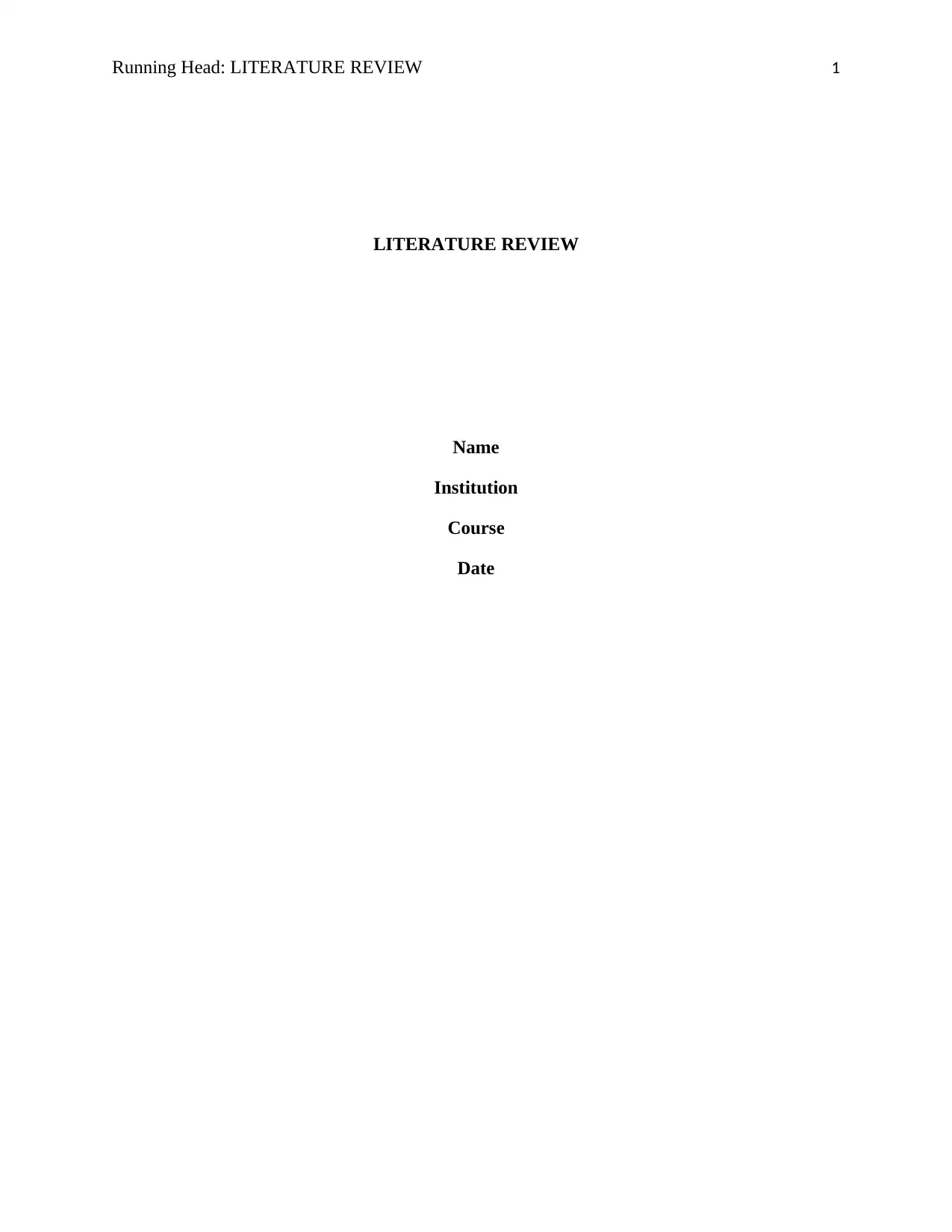
Running Head: LITERATURE REVIEW 1
LITERATURE REVIEW
Name
Institution
Course
Date
LITERATURE REVIEW
Name
Institution
Course
Date
Paraphrase This Document
Need a fresh take? Get an instant paraphrase of this document with our AI Paraphraser
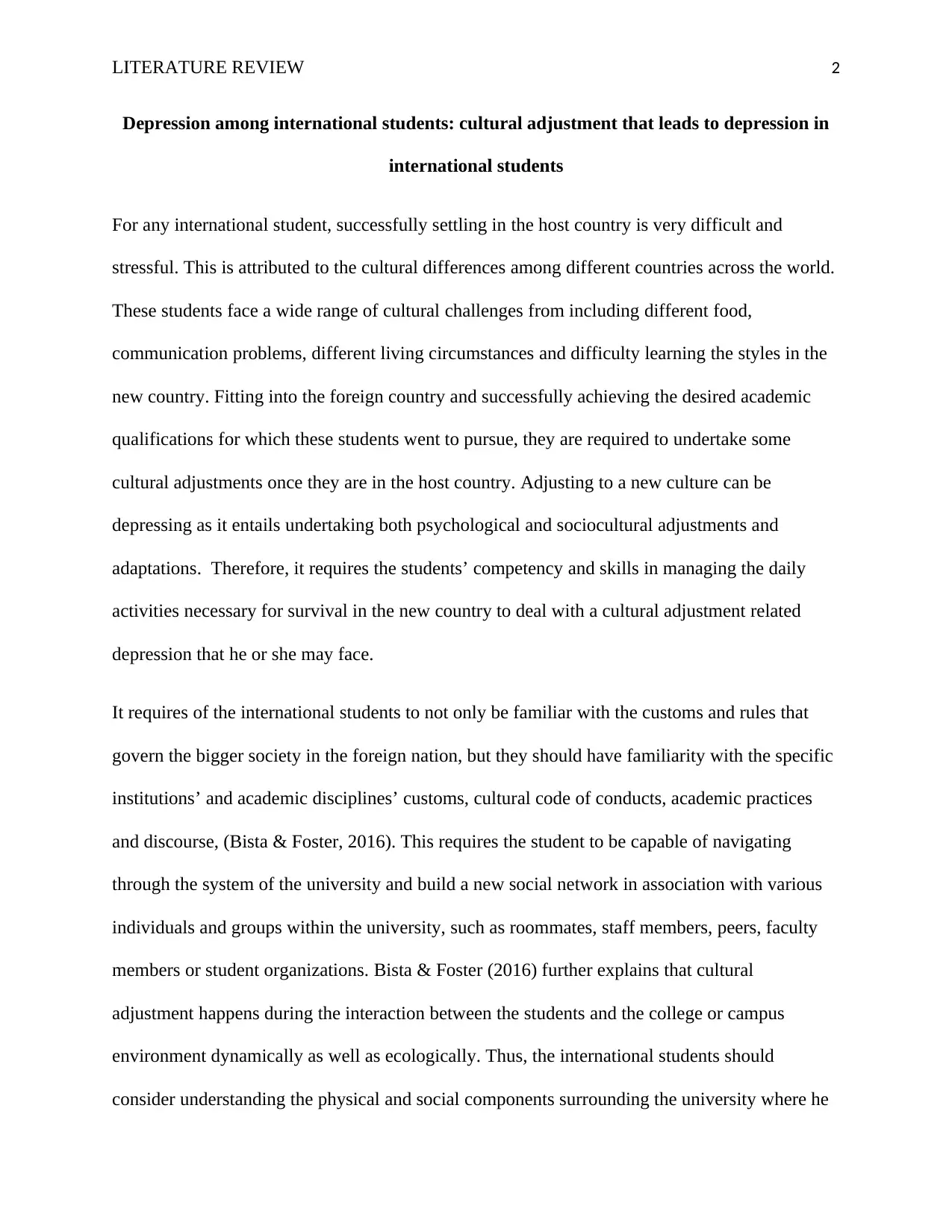
LITERATURE REVIEW 2
Depression among international students: cultural adjustment that leads to depression in
international students
For any international student, successfully settling in the host country is very difficult and
stressful. This is attributed to the cultural differences among different countries across the world.
These students face a wide range of cultural challenges from including different food,
communication problems, different living circumstances and difficulty learning the styles in the
new country. Fitting into the foreign country and successfully achieving the desired academic
qualifications for which these students went to pursue, they are required to undertake some
cultural adjustments once they are in the host country. Adjusting to a new culture can be
depressing as it entails undertaking both psychological and sociocultural adjustments and
adaptations. Therefore, it requires the students’ competency and skills in managing the daily
activities necessary for survival in the new country to deal with a cultural adjustment related
depression that he or she may face.
It requires of the international students to not only be familiar with the customs and rules that
govern the bigger society in the foreign nation, but they should have familiarity with the specific
institutions’ and academic disciplines’ customs, cultural code of conducts, academic practices
and discourse, (Bista & Foster, 2016). This requires the student to be capable of navigating
through the system of the university and build a new social network in association with various
individuals and groups within the university, such as roommates, staff members, peers, faculty
members or student organizations. Bista & Foster (2016) further explains that cultural
adjustment happens during the interaction between the students and the college or campus
environment dynamically as well as ecologically. Thus, the international students should
consider understanding the physical and social components surrounding the university where he
Depression among international students: cultural adjustment that leads to depression in
international students
For any international student, successfully settling in the host country is very difficult and
stressful. This is attributed to the cultural differences among different countries across the world.
These students face a wide range of cultural challenges from including different food,
communication problems, different living circumstances and difficulty learning the styles in the
new country. Fitting into the foreign country and successfully achieving the desired academic
qualifications for which these students went to pursue, they are required to undertake some
cultural adjustments once they are in the host country. Adjusting to a new culture can be
depressing as it entails undertaking both psychological and sociocultural adjustments and
adaptations. Therefore, it requires the students’ competency and skills in managing the daily
activities necessary for survival in the new country to deal with a cultural adjustment related
depression that he or she may face.
It requires of the international students to not only be familiar with the customs and rules that
govern the bigger society in the foreign nation, but they should have familiarity with the specific
institutions’ and academic disciplines’ customs, cultural code of conducts, academic practices
and discourse, (Bista & Foster, 2016). This requires the student to be capable of navigating
through the system of the university and build a new social network in association with various
individuals and groups within the university, such as roommates, staff members, peers, faculty
members or student organizations. Bista & Foster (2016) further explains that cultural
adjustment happens during the interaction between the students and the college or campus
environment dynamically as well as ecologically. Thus, the international students should
consider understanding the physical and social components surrounding the university where he
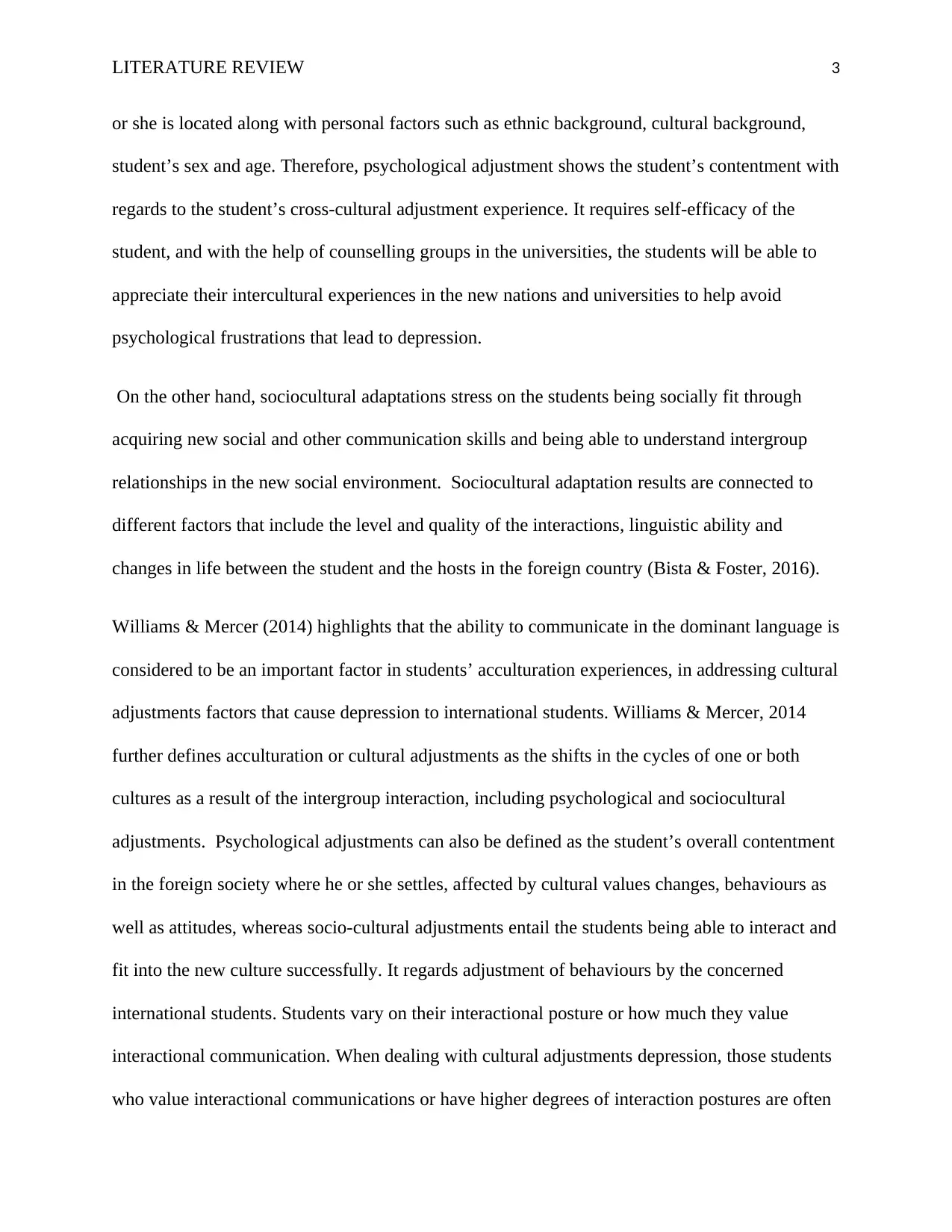
LITERATURE REVIEW 3
or she is located along with personal factors such as ethnic background, cultural background,
student’s sex and age. Therefore, psychological adjustment shows the student’s contentment with
regards to the student’s cross-cultural adjustment experience. It requires self-efficacy of the
student, and with the help of counselling groups in the universities, the students will be able to
appreciate their intercultural experiences in the new nations and universities to help avoid
psychological frustrations that lead to depression.
On the other hand, sociocultural adaptations stress on the students being socially fit through
acquiring new social and other communication skills and being able to understand intergroup
relationships in the new social environment. Sociocultural adaptation results are connected to
different factors that include the level and quality of the interactions, linguistic ability and
changes in life between the student and the hosts in the foreign country (Bista & Foster, 2016).
Williams & Mercer (2014) highlights that the ability to communicate in the dominant language is
considered to be an important factor in students’ acculturation experiences, in addressing cultural
adjustments factors that cause depression to international students. Williams & Mercer, 2014
further defines acculturation or cultural adjustments as the shifts in the cycles of one or both
cultures as a result of the intergroup interaction, including psychological and sociocultural
adjustments. Psychological adjustments can also be defined as the student’s overall contentment
in the foreign society where he or she settles, affected by cultural values changes, behaviours as
well as attitudes, whereas socio-cultural adjustments entail the students being able to interact and
fit into the new culture successfully. It regards adjustment of behaviours by the concerned
international students. Students vary on their interactional posture or how much they value
interactional communication. When dealing with cultural adjustments depression, those students
who value interactional communications or have higher degrees of interaction postures are often
or she is located along with personal factors such as ethnic background, cultural background,
student’s sex and age. Therefore, psychological adjustment shows the student’s contentment with
regards to the student’s cross-cultural adjustment experience. It requires self-efficacy of the
student, and with the help of counselling groups in the universities, the students will be able to
appreciate their intercultural experiences in the new nations and universities to help avoid
psychological frustrations that lead to depression.
On the other hand, sociocultural adaptations stress on the students being socially fit through
acquiring new social and other communication skills and being able to understand intergroup
relationships in the new social environment. Sociocultural adaptation results are connected to
different factors that include the level and quality of the interactions, linguistic ability and
changes in life between the student and the hosts in the foreign country (Bista & Foster, 2016).
Williams & Mercer (2014) highlights that the ability to communicate in the dominant language is
considered to be an important factor in students’ acculturation experiences, in addressing cultural
adjustments factors that cause depression to international students. Williams & Mercer, 2014
further defines acculturation or cultural adjustments as the shifts in the cycles of one or both
cultures as a result of the intergroup interaction, including psychological and sociocultural
adjustments. Psychological adjustments can also be defined as the student’s overall contentment
in the foreign society where he or she settles, affected by cultural values changes, behaviours as
well as attitudes, whereas socio-cultural adjustments entail the students being able to interact and
fit into the new culture successfully. It regards adjustment of behaviours by the concerned
international students. Students vary on their interactional posture or how much they value
interactional communication. When dealing with cultural adjustments depression, those students
who value interactional communications or have higher degrees of interaction postures are often
⊘ This is a preview!⊘
Do you want full access?
Subscribe today to unlock all pages.

Trusted by 1+ million students worldwide
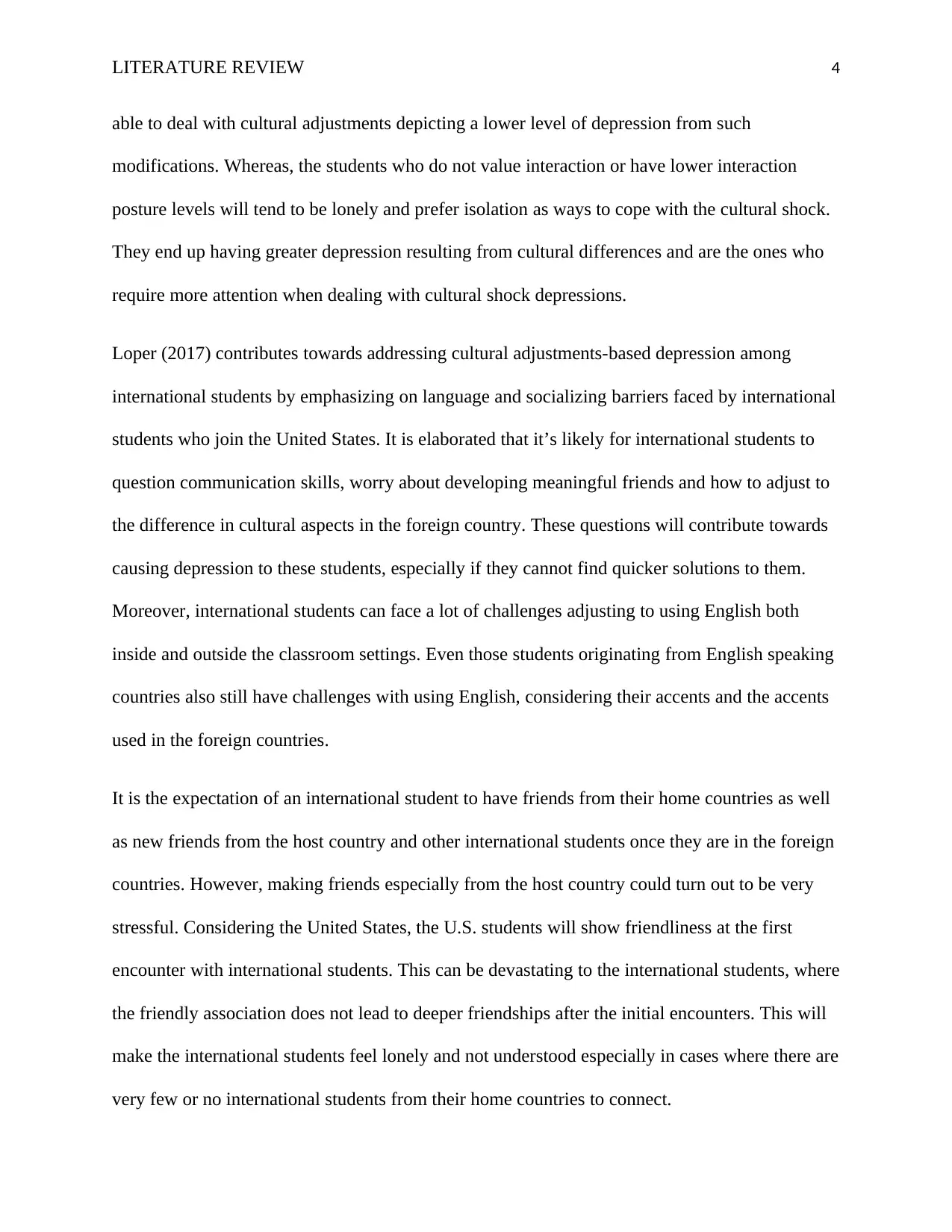
LITERATURE REVIEW 4
able to deal with cultural adjustments depicting a lower level of depression from such
modifications. Whereas, the students who do not value interaction or have lower interaction
posture levels will tend to be lonely and prefer isolation as ways to cope with the cultural shock.
They end up having greater depression resulting from cultural differences and are the ones who
require more attention when dealing with cultural shock depressions.
Loper (2017) contributes towards addressing cultural adjustments-based depression among
international students by emphasizing on language and socializing barriers faced by international
students who join the United States. It is elaborated that it’s likely for international students to
question communication skills, worry about developing meaningful friends and how to adjust to
the difference in cultural aspects in the foreign country. These questions will contribute towards
causing depression to these students, especially if they cannot find quicker solutions to them.
Moreover, international students can face a lot of challenges adjusting to using English both
inside and outside the classroom settings. Even those students originating from English speaking
countries also still have challenges with using English, considering their accents and the accents
used in the foreign countries.
It is the expectation of an international student to have friends from their home countries as well
as new friends from the host country and other international students once they are in the foreign
countries. However, making friends especially from the host country could turn out to be very
stressful. Considering the United States, the U.S. students will show friendliness at the first
encounter with international students. This can be devastating to the international students, where
the friendly association does not lead to deeper friendships after the initial encounters. This will
make the international students feel lonely and not understood especially in cases where there are
very few or no international students from their home countries to connect.
able to deal with cultural adjustments depicting a lower level of depression from such
modifications. Whereas, the students who do not value interaction or have lower interaction
posture levels will tend to be lonely and prefer isolation as ways to cope with the cultural shock.
They end up having greater depression resulting from cultural differences and are the ones who
require more attention when dealing with cultural shock depressions.
Loper (2017) contributes towards addressing cultural adjustments-based depression among
international students by emphasizing on language and socializing barriers faced by international
students who join the United States. It is elaborated that it’s likely for international students to
question communication skills, worry about developing meaningful friends and how to adjust to
the difference in cultural aspects in the foreign country. These questions will contribute towards
causing depression to these students, especially if they cannot find quicker solutions to them.
Moreover, international students can face a lot of challenges adjusting to using English both
inside and outside the classroom settings. Even those students originating from English speaking
countries also still have challenges with using English, considering their accents and the accents
used in the foreign countries.
It is the expectation of an international student to have friends from their home countries as well
as new friends from the host country and other international students once they are in the foreign
countries. However, making friends especially from the host country could turn out to be very
stressful. Considering the United States, the U.S. students will show friendliness at the first
encounter with international students. This can be devastating to the international students, where
the friendly association does not lead to deeper friendships after the initial encounters. This will
make the international students feel lonely and not understood especially in cases where there are
very few or no international students from their home countries to connect.
Paraphrase This Document
Need a fresh take? Get an instant paraphrase of this document with our AI Paraphraser
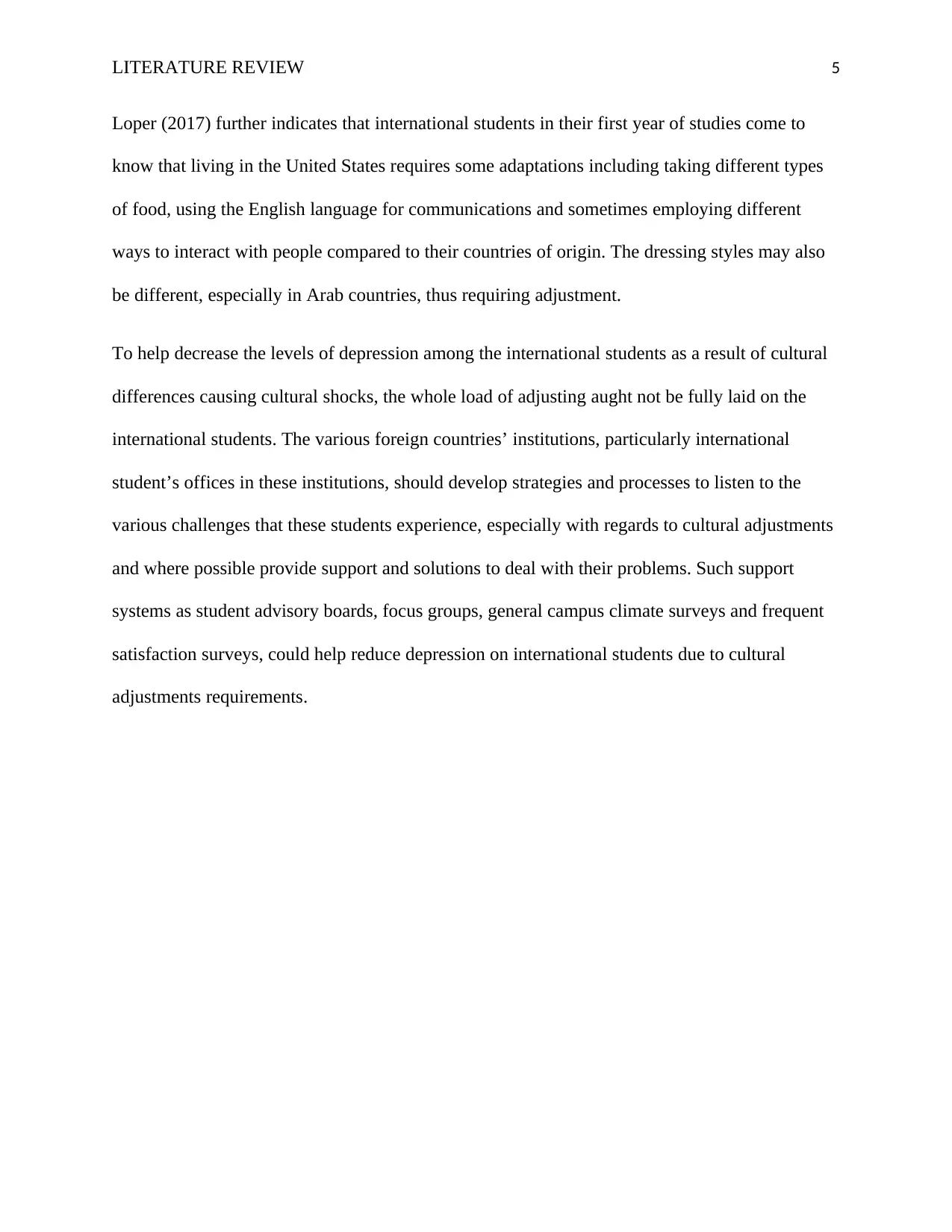
LITERATURE REVIEW 5
Loper (2017) further indicates that international students in their first year of studies come to
know that living in the United States requires some adaptations including taking different types
of food, using the English language for communications and sometimes employing different
ways to interact with people compared to their countries of origin. The dressing styles may also
be different, especially in Arab countries, thus requiring adjustment.
To help decrease the levels of depression among the international students as a result of cultural
differences causing cultural shocks, the whole load of adjusting aught not be fully laid on the
international students. The various foreign countries’ institutions, particularly international
student’s offices in these institutions, should develop strategies and processes to listen to the
various challenges that these students experience, especially with regards to cultural adjustments
and where possible provide support and solutions to deal with their problems. Such support
systems as student advisory boards, focus groups, general campus climate surveys and frequent
satisfaction surveys, could help reduce depression on international students due to cultural
adjustments requirements.
Loper (2017) further indicates that international students in their first year of studies come to
know that living in the United States requires some adaptations including taking different types
of food, using the English language for communications and sometimes employing different
ways to interact with people compared to their countries of origin. The dressing styles may also
be different, especially in Arab countries, thus requiring adjustment.
To help decrease the levels of depression among the international students as a result of cultural
differences causing cultural shocks, the whole load of adjusting aught not be fully laid on the
international students. The various foreign countries’ institutions, particularly international
student’s offices in these institutions, should develop strategies and processes to listen to the
various challenges that these students experience, especially with regards to cultural adjustments
and where possible provide support and solutions to deal with their problems. Such support
systems as student advisory boards, focus groups, general campus climate surveys and frequent
satisfaction surveys, could help reduce depression on international students due to cultural
adjustments requirements.
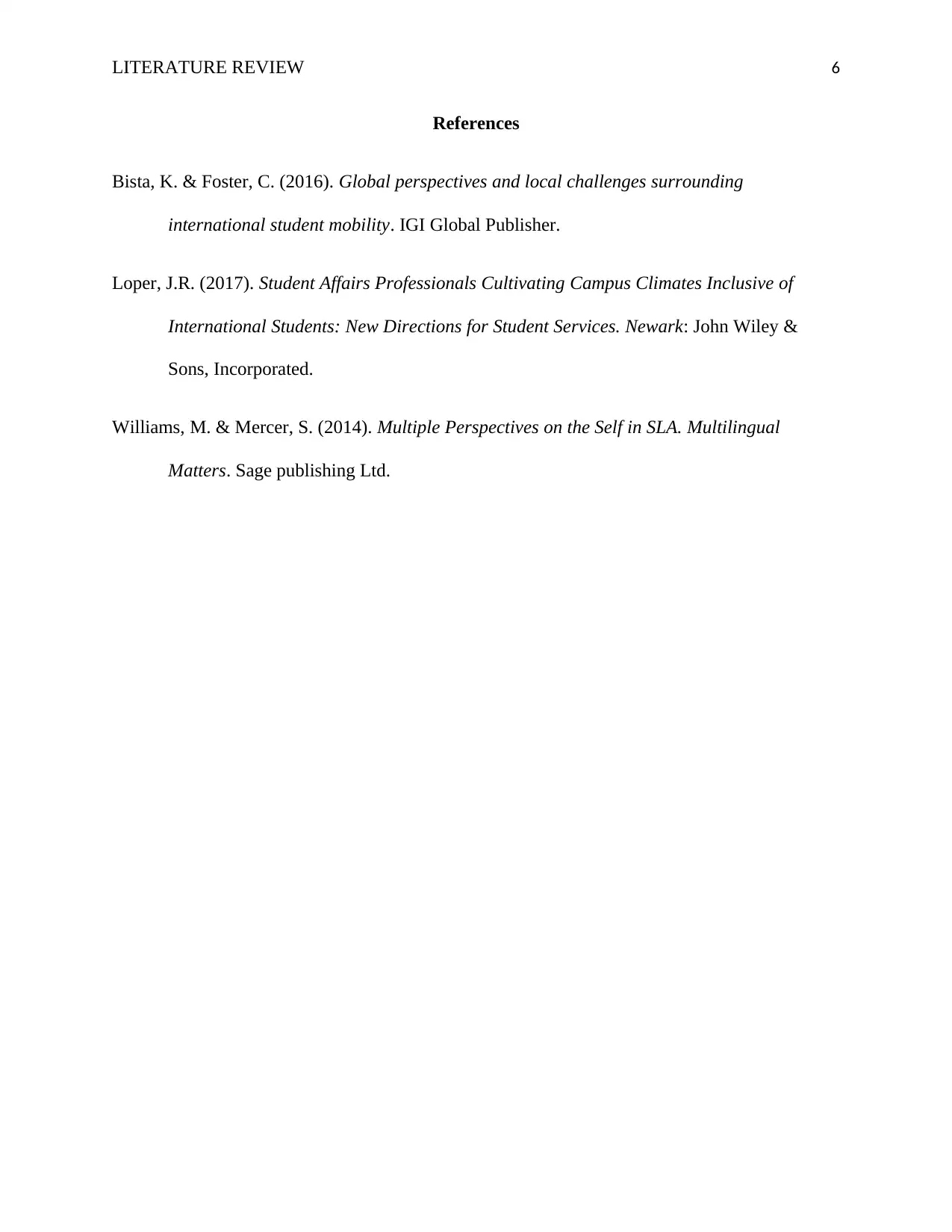
LITERATURE REVIEW 6
References
Bista, K. & Foster, C. (2016). Global perspectives and local challenges surrounding
international student mobility. IGI Global Publisher.
Loper, J.R. (2017). Student Affairs Professionals Cultivating Campus Climates Inclusive of
International Students: New Directions for Student Services. Newark: John Wiley &
Sons, Incorporated.
Williams, M. & Mercer, S. (2014). Multiple Perspectives on the Self in SLA. Multilingual
Matters. Sage publishing Ltd.
References
Bista, K. & Foster, C. (2016). Global perspectives and local challenges surrounding
international student mobility. IGI Global Publisher.
Loper, J.R. (2017). Student Affairs Professionals Cultivating Campus Climates Inclusive of
International Students: New Directions for Student Services. Newark: John Wiley &
Sons, Incorporated.
Williams, M. & Mercer, S. (2014). Multiple Perspectives on the Self in SLA. Multilingual
Matters. Sage publishing Ltd.
⊘ This is a preview!⊘
Do you want full access?
Subscribe today to unlock all pages.

Trusted by 1+ million students worldwide
1 out of 6
Related Documents
Your All-in-One AI-Powered Toolkit for Academic Success.
+13062052269
info@desklib.com
Available 24*7 on WhatsApp / Email
![[object Object]](/_next/static/media/star-bottom.7253800d.svg)
Unlock your academic potential
Copyright © 2020–2026 A2Z Services. All Rights Reserved. Developed and managed by ZUCOL.





